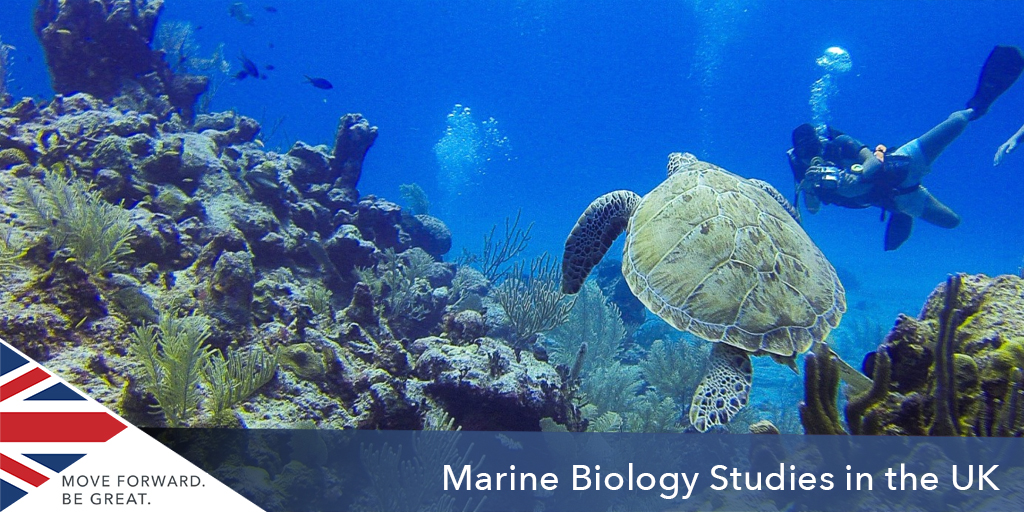Marine biology is the study of organisms and ecosystems in oceans. It entails studying all marine life forms underwater, from microscopic organisms to plants and beings. The scope of Marine Biology is broad and complex. It is a research-led field that includes collecting sea specimens, accumulating data, and conducting lab experiments.
Students should have studied science, particularly biology, to pursue marine biology studies. It is common to study further in the field to gain specialisation. If they have not studied Marine Biology, students from biology, geology, ecology, oceanography, and zoology backgrounds are considered for postgraduate studies. Those pursuing a career in Marine Biology do so because of their passion for the field.
Marine biologists need to be very perceptive, pay close attention to detail, and document details at an exacting level. They should also be comfortable on and in water, know basic safety, such as first aid, and be able to handle research paraphernalia.

Top 10 UK Universities for Marine Biology
Learn more about the top 10 UK universities (QS World University Rankings by Subject 2024) to study a marine biology degree below.
1. University of Cambridge
Cambridge University's BA (Hons) Natural Sciences offers a detailed four-year curriculum. Students engage in 12 lectures and 4 supervisions weekly in the first year, alongside practical labs. Year two involves 9 lectures and 3 supervisions weekly, with additional project work and coursework.
Years three and four vary depending on chosen courses, offering specialised biological or physical sciences studies. Assessment methods include written exams, practicals, coursework, essays, oral exams, and projects, promoting a comprehensive learning experience with an MSci option.
- Suggested course: BA (Hons) Natural Sciences
- Entry requirements: A level: A*A*A. IB: 41-42 points, with 776 at Higher Level.
- International fee: £39,162
- QS World Ranking: 2nd
2. University of Oxford
The MSc in Biodiversity, Conservation and Management at Oxford gives a broad understanding of biodiversity science within socio-economic, political, and cultural contexts. Embedded in conservation biogeography and governance, the curriculum addresses global change and emerging conservation methodologies.
Course objectives include critical engagement with interdisciplinary concepts, analysis of conservation governance mechanisms, and understanding ethical implications and technological advancements. Elective modules provide a tailored learning experience. The programme ends with an independent research project, emphasising advanced research design and hypothesis development.
- Suggested course: MSc in Biodiversity, Conservation and Management
- Entry requirements: A first-class or strong upper-second-class undergraduate degree with honours in any discipline.
- International fee: £31,980
- QS World Ranking: 2nd
3. University College London
The Aquatic Conservation, Ecology and Restoration MSc at UCL Geography addresses prompting environmental challenges threatening aquatic resources. Combining interdisciplinary expertise, the programme focuses on practical surveying, taxonomy, and conservation planning skills. Taught by renowned researchers and industry experts, it emphasises landscape-scale conservation, monitoring, and stakeholder engagement.
External speakers from leading environmental organisations enrich the curriculum with real-world insights. The course cultivates a vibrant academic environment, facilitating collaboration, debate, and ongoing learning. Graduates emerge equipped to address complex aquatic conservation and restoration issues at the forefront of scientific innovation.
- Suggested course: Aquatic Conservation, Ecology and Restoration MSc
- Entry requirements: A minimum of an upper second-class Bachelor's degree in a relevant discipline from a UK university or an overseas qualification of an equivalent standard.
- International fee: £34,400
- QS World Ranking: 17th
4. University of Leeds
The Environmental Science BSc at Leeds offers a comprehensive study of environmental issues across the geosphere, atmosphere, hydrosphere, and biosphere. Students can design their degrees according to their personal interests. Fieldwork is integral to the programme, providing practical experience and opportunities for a broad perspective.
In the first year, foundational principles are covered alongside training in academic and fieldwork skills. The second year offers specialisation in Applied Environmental Science or earth system science, emphasising refining academic skills and data analysis. The third year involves further specialisation through optional modules and a research dissertation, fostering engagement with research culture and mentorship.
- Suggested course: Environmental Science BSc
- Entry requirements: A-level: ABB includes two courses in Biology, Chemistry, Geology, Geography, Environmental Science, Mathematics, and Physics. IB 16 points.
- International fee: £30,250
- QS World Ranking: 17th
5. Imperial College London
The MSc Hydrology and Water Resources Management at Imperial College acquaints you with hydrology's theoretical and practical aspects. Accredited by the Joint Board of Moderators, it provides industry recognition and hands-on experience through field trips and global hydrological challenges. Students explore modern hydrological issues, including the impact of man-made and climate change on water distribution and quality.
Core modules cover environmental fluid mechanics, hydrogeology, meteorology, urban hydrology, and more, enhancing theoretical and practical knowledge. Students also conduct individual research projects, furthering their understanding and water resource management expertise.
- Suggested course: MSc Hydrology and Water Resources Management
- Entry requirements: 2:1 in civil engineering, natural sciences, earth sciences or other numerate disciplines.
- International fee: £40,900
- QS World Ranking: 21st
6. University of Edinburgh
The Marine Systems and Policies MSc at the University of Edinburgh addresses urgent challenges facing the world's oceans amidst rapid climate change and increasing human activities. The programme thoroughly explores marine science and policy, focusing on marine nature conservation, environmental protection, and marine planning.
Through coursework, field trips, and real-world case studies, students learn to evaluate policies and critically influence new policy development. The programme also includes an independent research dissertation project, offering opportunities for internships and placements to enhance further skills in policy analysis, marine science, and science communication.
- Suggested course: Marine Systems and Policies MSc
- Entry requirements: A UK 2:1 honours degree, or its international equivalent, in natural or social sciences, but with clear evidence of experience and interest in marine topics.
- International fee: £36,700
- QS World Ranking: 24th
7. University of Bristol
The Environmental Geoscience BSc at the University of Bristol presents a thorough study of Earth's systems and environmental sciences, ranked second in the UK for research. Students examine geology, biology, chemistry, and physics interactions, gaining insight into how human activities influence Earth's environment. Taught by leading experts, coursework includes cutting-edge topics like Hydrology, Environmental Impact Assessments, and Oceans and Climates.
Fieldwork experiences in the UK and overseas promote practical skills and close ties with the community. The programme highlights hands-on learning, independent projects, and the development of highly valued scientific and transferable skills, ensuring graduates are well-prepared for diverse career paths.
- Suggested course: BSc Environmental Geoscience
- Entry requirements: A-level: ABB, including two science-related subjects. IB diploma: 32 points overall, with 16 at Higher Level.
- International fee: £29,300
- QS World Ranking: 24th
8. University of Southampton
The Marine Biology with Oceanography (BSc) at the University of Southampton offers extensive training in marine biology and its intersection with physical and chemical oceanography. In the first year, compulsory modules provide foundational marine life and oceanography knowledge alongside practical field skills.
Years two and three offer opportunities for specialisation through optional modules and independent research projects. Field trips, including a 10-day course in Plymouth, provide hands-on experience in marine sampling and data collection. Graduates are prepared for research, wildlife management, or government agency careers, equipped with a diverse skill set encompassing biology, chemistry, physics, and mathematics.
- Suggested course: Marine Biology with Oceanography (BSc)
- Entry requirements: A-levels: ABB including Biology (minimum grade B) and one further science subject (minimum grade B). IB Diploma: Pass, with 32 points overall.
- International fee: £27,400
- QS World Ranking: 38th
9. University of Exeter
The BSc Marine Science at the University of Exeter covers the study of marine environments, particularly in Cornwall's diverse marine landscape. Through hands-on modules, students gain physical, biological, geological, and environmental marine science expertise, including oceanography. It also gives access to leading research groups and applied research projects.
Placement opportunities in the offshore sector and marine agencies bolster employability. Core material in the first year covers key aspects of marine science, with optional modules in the second year for specialisation. The third year focuses on research-led modules and a personalised research project, allowing students to explore deeper into their chosen sub-component of marine science.
- Suggested course: BSc Marine Science
- Entry requirements: A-level: AAB - ABB; B in two science subjects. IB diploma: 34/665 - 32/655; HL5 in two science subjects.
- International fee: £29,700
- QS World Ranking: 40th
10. University of Reading
The MSc Atmosphere, Ocean and Climate at the University of Reading offers a rigorous curriculum that covers the climate system. Core modules include fundamental principles of weather and climate, modelling, data analysis, and fluid dynamics of the atmosphere and oceans.
A research project provides hands-on experience in scientific research, while weather and climate discussions deepen understanding of global weather events. Through quantitative analysis and computational methods, students develop a deep understanding of the physical processes shaping weather and climate, equipping them for impactful knowledge and experience of the subject.
- Suggested course: MSc Atmosphere, Ocean and Climate
- Entry requirements: Normally a good undergraduate honours degree (2:2 or above) in a mathematical/physical science or a closely related subject.
- International fee: £26,950
- QS World Ranking: 42nd
Careers in Marine Biology
Marine biologists work in field research, teaching, hydrology, science writing, and universities. Their work environments range from managing a flora and fauna preserve to combining data and computer models or lecturing a classroom full of university students.
Marine biologists can make a good living, but it is not a money-rich profession. Hence, those who pursue marine biology do so because of their love of the work and caring for the environment and underwater life.
Study Marine Biology in the UK
If you are interested in studying marine biology in the UK and want to learn more about the universities and application process, arrange your free consultation with SI-UK.













 I sincerely thank SI-UK for getting me accepted to UCL. The MSc in Urban Development and Planning is extremely competitive, but the right guidance provided by SI-UK made my dream of studying at University College London a reality. The services were exceptional from beginning to end.
I sincerely thank SI-UK for getting me accepted to UCL. The MSc in Urban Development and Planning is extremely competitive, but the right guidance provided by SI-UK made my dream of studying at University College London a reality. The services were exceptional from beginning to end. 

